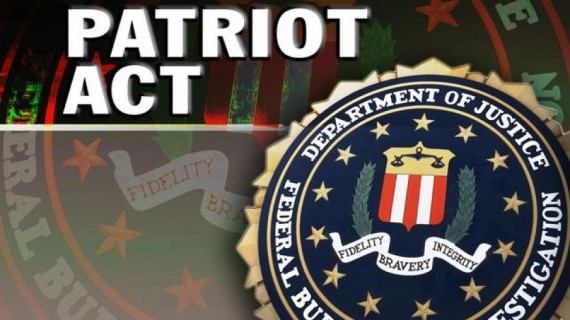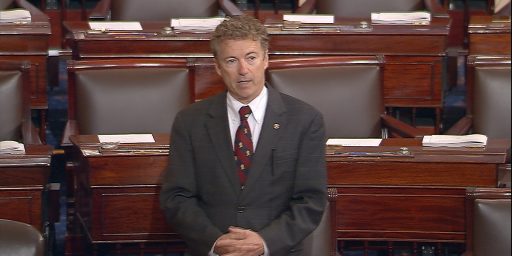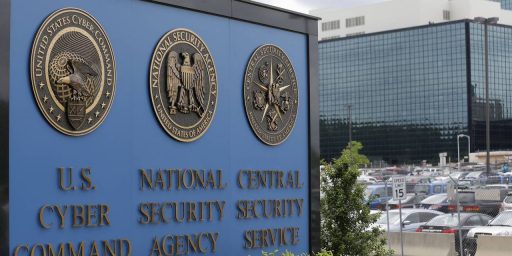Patriot Act Lapses, Civilization Still Stands
Many provisions of the Patriot Act lapsed at midnight, but apparently the world hasn't ended.
As most observers expected, the Senate failed last night to pass legislation to extend many of the data collection practices of the National Security Agency thanks in large part to Kentucky Senator Rand Paul:
The legal authority for several national security programs expired at midnight Sunday and will not be renewed for at least two days, after Senate Republicans leaders were unable to maneuver around Sen. Rand Paul (R-Ky.), a presidential candidate who followed through on a pledge to block an extension of the law.
The Senate closed a rare Sunday session without approving the only legislation that would have averted a lapse in the authority — a House-passed bill that would provide for an orderly transition away from the most controversial program authorized under the current law: the National Security Agency’s bulk collection of call records from telephone companies.
Spurred by the impending deadline, senators voted overwhelmingly, 77 to 17, to proceed with the measure Sunday, a week after they didn’t act on it before starting a week-long recess. But Paul, under Senate rules, was able to delay final passage of the bill until at least Tuesday.
Immediately after the vote, Paul took the floor and began his remarks by conceding that the measure he opposes would eventually pass. But after he left the floor, he declared victory because the House bill, known as the USA Freedom Act, would end the government’s collection of phone records.
“The point we wanted to make is, we can still catch terrorists using the Constitution,” he said. “I’m supportive of the part that ends bulk collection by the government. My concern is that we might be exchanging bulk collection by the government [with] bulk collection by the phone companies.”
During an early-morning session on May 23, Paul used his powers under Senate rules to foil Majority Leader Mitch McConnell’s efforts to extend the existing authority for 60 days, a week, or even one day. On Sunday, he objected to a proposal from McConnell (R-Ky.) that would have extended less-controversial surveillance programs while the debate about the NSA telephone program continued.
That prompted a fiery floor speech from McConnell, who accused Paul and other opponents of the NSA program of engaging in a “campaign of demagoguery and disinformation” prompted by the “illegal actions” of former NSA contractor Edward Snowden.
“We shouldn’t be disarming unilaterally as our enemies grow more sophisticated and aggressive,” said McConnell, who has endorsed Paul for president and looked directly at Paul at times as he delivered his remarks. He later made procedural moves to prevent Paul from offering amendments he has sought to the pending bill.
The NSA’s collection of phone records began in secret after the Sept. 11, 2001, attacks and was later authorized, also in secret, by a court under Section 215 of the USA Patriot Act — the provision that is set to expire. The continuation of the program and its justification were revealed in 2013 by Snowden.
Until Sunday, McConnell had resisted taking action on the House bill, arguing alongside other key Republican senators that it would not do enough to preserve necessary counterterrorism capabilities.
Those senators on Sunday pledged to amend the USA Freedom Act to provide further assurances that intelligence officials will have timely access to the phone records, even if they remain in private hands. If the bill is amended, it would go back to the House, whose leaders have resisted any suggestion that more changes are needed, further extending the lapse in authority.
House Speaker John A. Boehner (R-Ohio) on Sunday repeated calls for the Senate to pass the USA Freedom Act, which would provide for an orderly transition away from the bulk collection program and cleared the House earlier this month by an overwhelming vote of 338 to 88.
“Al-Qaeda, ISIL and other terrorists around the globe continue to plot attacks on America and our allies,” Boehner said, using an acronym for the Islamic State. “Anyone who is satisfied with letting this critical intelligence capability go dark isn’t taking the terrorist threat seriously. I’d urge the Senate to pass the bipartisan USA Freedom Act, and do so expeditiously.”
(…)
The USA Freedom Act is the product of months of compromise between Republicans and Democrats, the administration and privacy groups. Under it, the NSA would stop gathering billions of call records — their times, dates and durations, but not their content. Instead, the phone companies would be required to adapt their systems so that they could be queried for records of specific terrorism suspects based on individual court orders. The bill also would renew other expiring investigative powers that the FBI says are critical.
But Paul, who wants the NSA program ended outright, and a handful of senators who prefer that the NSA program remain as is, effectively blocked action on the bill until Sunday. McConnell had counted on the impending deadline to force at least a short-term extension of the current law, but Paul and a few other senators blocked any stopgap.
The Senate will reconvene today to begin the process of debating the USA Freedom Act and, as Senator Paul conceded in his speech last night, the bill is likely to pass. What Paul, along with Democratic Senators such as Ron Wyden, appear to be hoping to do is to push for Senate consideration of amendments that would place further restrictions on the bulk data collection program beyond those covered by the new bill itself. As I’ve said before, the USA Freedom Act strikes me as mostly a reasonable compromise on this issue since it takes the ability to store and access metadata away from the NSA. Instead, that agency or any other branch of the Federal Government that wishes to access this data would need to obtain a warrant via the procedures authorized under the Foreign Intelligence Surveillance Act. Senators Paul and Wyden object to the manner in which the new bill does this because it would authorize law enforcement to effectively issue general warrants directed at a particular telecommunications company rather than specific warrants requesting information regarding the metadata related to a specific user, phone number, or internet address. Paul and Wyden’s amendments, from what I’ve been able to gather, would require more specificity in the warrants, which seems to me like an entirely reasonable idea.
In the end, those amendments will most likely fail, and the USA Freedom Act will pass in something largely resembling its current form. Notwithstanding that, it strikes me that this entire debate has been very instructive for those Americans who have paid attention to it. The panicked rhetoric from the White House, the intelligence community, and most of the Senate about what would happen if the Patriot Act were allowed to lapse has been laughably absurd, especially in light of the FBI’s admission that the powers granted by the act had not stopped a single terror attack and that the Patriot Act has been used more in drug cases than terror cases in its fourteen year history. If nothing else, it is now quite clear where certain people in both the Republican and Democratic parties stand when it comes to civil liberties issue. Whether the American people will care about that is there choice, but as far as I’m concerned Senators Paul and Wyden have done the nation a great service.






Not for long, Doug, not for long.
Instead, that agency or any other branch of the Federal Government that wishes to access this data would need to obtain a
warrantRUBBER STAMP via the procedures authorized under the Foreign Intelligence Surveillance Act.FTFY Doug. You’ll get my bill in the mail.
Of course if anything bad happens now, no matter how long it has been in the works, this lapse will be blamed.
If at the end of the day, the USA Freedom Act passes, as you concede, largely resembling its current form, just what “great service” have (your) heros provided?
BTW, “….American people will care about that is
theretheir choice,….”Tweet I read on MJ.
12:00am – Patriot Act expires 12:01am – Sharia law replaces Constitution 12:02am – Starbucks closes, re-opens as chain of victory mosques
— Daniel Lin (@DLin71) June 1, 2015
The tyranny of low expectations. The USA Freedom Act is The Patriot Act Unreformed. It will be in place before long, sure to be just as broadly interpreted and/or abused. In the meantime, Paul has turned his party against him in a way that makes it difficult for him to ever hold another office as a Republican.
So cui bono? Short answer, not us and certainly not Rand Paul. High five.
@Rodney Dill: And within 24 hrs certain people will claim it is a false flag operation of the gov’t.